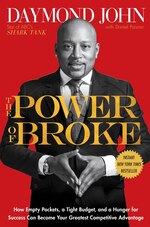A lot of people believe you only have one shot at success.
Let’s agree that’s just not true.
But what is true is that many people don’t even take that one shot – out of fear of failure, inexperience, lack of motivation or just not knowing where to begin.
Daymond John, one of the stars of ABC TV’s “Shark Tank,” wants to change all that.
He has written “The Power of Broke: How Empty Pockets, a Tight Budget, and a Hunger for Success Can Become Your Greatest Competitive Advantage,” a terrific book devoted to getting you ready to take that one shot.
As Daymond says, his book “is all about substance over flash.
It’s about creativity over certainty.
It’s about taking a shot over playing it safe.”
I’ve never met Daymond, but I’m a big believer in studying successful people. That’s exactly what Daymond does in his book. He highlights many character traits in chapters about being relentless, nice, funny, resilient, visionary, adventurous and more. Each chapter centers on individuals who excelled in these areas, such as direct marketing whiz Jay Abraham on being agile and world-renowned deejay Steve Aoki on being resourceful.
Daymond is a case study by himself. He started selling home-sewn hats on the streets of Queens, NY. His initial b udget was $40, which necessitated devising some very innovative ways to promote his products. His entrepreneurial exercise developed into the FUBU brand, which is now a $6 billion company.
udget was $40, which necessitated devising some very innovative ways to promote his products. His entrepreneurial exercise developed into the FUBU brand, which is now a $6 billion company.
He credits his success with starting out broke, which forced him to think more creatively. As he says, “It forces you to use your resources more efficiently. It forces you to connect with your customers more authentically and market your ideas more imaginatively. It forces you to be true to yourself, stay laser focused on your goals, and come up with those innovative solutions required to get noticed and make a meaningful mark.”
Daymond has an interesting take on innovation. He believes it starts from the bottom up, rather than the top down. He makes a good point when you think about it. Break dancing, rap music, slam poetry, iPods and smart watches happen in an organic way and grow.
He says: “People either respond to it or they don’t, and it doesn’t matter how much money you throw at it, how much you try to dress it up, it is what it is.”
As the author of “Swim With the Sharks Without Being Eaten Alive,” I was intrigued by Daymond’s “SHARK points.” Using the SHARK acronym he writes:
- Set a goal. His key points are that goals are much like what I preach – goals must be realistic and in writing. “Aim too high and you’re bound to be frustrated, disappointed,” Daymond writes. “Aim too low and you might leave some opportunities on the table.”
- Homework, do yours. You have to know your product as well as your competitors’. Daymond says: “… a shark doesn’t attack unless it knows its prey; here on land a ‘shark’ needs the same mix of insight, instincts and information to keep out in front.”
- Adore what you do. The subtitle of my second book is “Do what you love. Love what you do. And deliver more than you promise.” You have to have a passion for what you do.
- Remember, you are the brand. Daymond writes: “You are what you eat. You are what you wear. You are what you drive, where you love, what you drink, how you vote, what you stand for … It all starts with how you carry yourself, what you put out into the world, the way you interact with your audience, your customers, the marketplace. It’s on you. Just you.”
- Keep swimming. Daymond says that even when sharks are asleep they are “swimming, scheming, getting ready to attack – which is pretty much the approach you have to take when you’re starting out in business. You have to be relentless, nimble, moving ever forward. No matter what ….If they don’t keep swimming, they die.”
Perhaps the reason this book resonates with me is that I started my envelope company with much of the same enthusiasm: a big dream with very limited funds, antiquated equipment, not nearly enough experience, but an overwhelming desire to succeed and willingness to work tirelessly to succeed.
Broke is just a starting place. It’s up to you to take the next steps.
Mackay’s Moral: Being broke isn’t the same as being broken.
